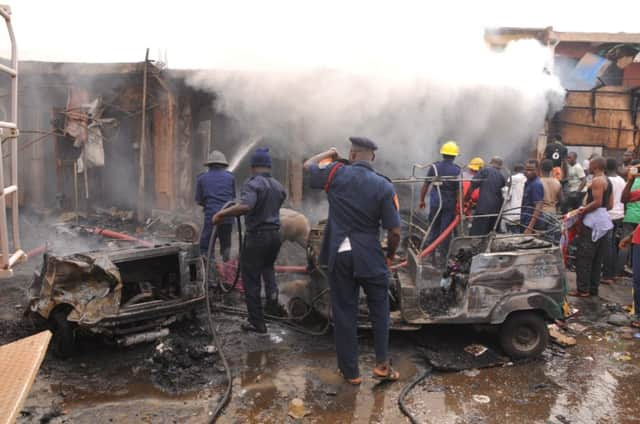Nigeria: Village razed to ground by Boko Haram


Three villages were attacked by Boko Haram, one near Chibok, where the Islamist group kidnapped some 300 schoolgirls last month, taking them into the forest in trucks.
Apagu Maidaga, of Alagarno village, said residents hid in the bush and watched as the extremists set fire to their thatched mud huts. “We saw our village up in flames as we hid waiting for the dawn; we lost everything,” he said.
Advertisement
Hide AdAdvertisement
Hide AdNews of the attacks came as the clean-up continued after 118 people were killed in twin car-bomb blasts in the central city of Jos. Buildings collapsed in the busy marketplace after the explosions on Tuesday night.
Raging fires ignited by the massive blasts mean rescue workers are unlikely to find any survivors. At least 118 bodies were taken to hospital morgues, with 64 wounded receiving hospital treatment, officials said. Hundreds of people gathered there in the hope of finding missing loved ones. “We expect to find more bodies in the rubble,” said search co-ordinator Mohammed Abdulsalam.
Police bomb squad officers yesterday dug into a crater left by one of the two car bombs.
Security forces cordoned off an area of rubble, burned-out vehicles and razed buildings with the debris of panic scattered around – a sandal here, a hat there.
Gloria Paul, from nearby Bingham University Teaching Hospital, was searching for her husband. All she found was his parked car, the windows shattered.
Mark Lipdo, of the Stefanos Foundation, a Christian charity based in Jos, said at least one of Tuesday’s blasts could have been averted if authorities had acted in time. He said a white van that held the first bomb was parked for hours in the market, raising suspicions of vendors who reported it to the authorities, but nothing was done.
He said a man with explosives strapped to his body was arrested on Saturday and told police militants had been ordered to plant bombs at churches and public areas in Jos.
President Goodluck Jonathan blamed Boko Haram for Tuesday’s attack, assuring Nigerians their government “remains fully committed to winning the war against terror”.
Advertisement
Hide AdAdvertisement
Hide Ad“This administration will not be cowed by the atrocities of enemies of human progress and civilization,” a statement said.
Outrage continues to grow at home and abroad over his government’s failure to curb a five-year-old Islamist uprising that grabbed world attention with the abduction of the Chibok girls who Boko Haram threatens to sell into slavery.
On Monday a car bomb at a bus station killed 24 people in the Christian quarter of the northern Muslim city of Kano, where police later defused another car bomb. Two bomb blasts in April at another bus station in capital, Abuja, killed more than 120 and wounded more than 200.
There was speculation Tuesday’s blasts could have been aimed at igniting rivalries between Christians and Muslims in Jos, on a fault line dividing the mainly Muslim north from the Christian south. Boko Haram wants to impose Sharia law in Nigeria, though half its 170 million people are Christians.
The insurgency has become deadlier, with more than 2,000 people killed this year compared to an estimated 3,600 between 2010 and 2013.
The US embassy in Abuja condemned the Jos attack and said America was helping Nigeria “grapple with violent extremism”. It added: “We join the voices of those appealing for calm.”